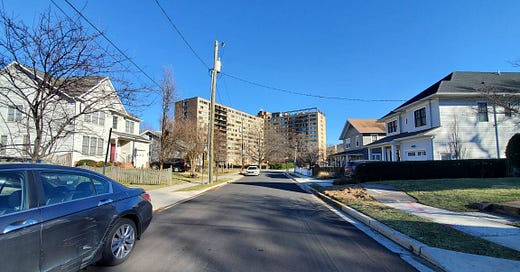One of the things I think and write about a lot here is how exactly housing got pulled into the culture war. Why, for example, “I will not live in a pod, I will not eat the bugs” became a right-wing meme, linking two unrelated things and giving new housing construction a radical, un-American sheen.
Why so many people seem so fearful of the normal activity that goes on in a healthy, vibrant neighborhood. (The people on the Nextdoor app who fret about people out walking, for example.) How boring policy discussions about parking or transit or what have you become so heated and emotional.
I’ve seen some of this in Arlington, Virginia with the “missing middle” housing debate going on there. It would permit smaller multi-unit buildings on most residential lots in the county, effectively abolishing single-family zoning. Obviously, that’s going to be controversial. But some of the stuff I’ve seen is above and beyond simply that.
One of the things I’ve realized is this: people look at the pointed language about, say, single-family homeowners in Arlington. Stuff about how zoning has a racially problematic history. Or about how suburbanites who care about the environment are being hypocritical. Or whatever it is. And they see it as directed at them. They interpret it as antipathy, rather than critique. And they feel set upon, like they’re being personally attacked.
The tone of some popular housing and urbanism folks on the internet can sometimes seem to back that up. I remember seeing once on Twitter, a post to the effect of “Don’t you love it when a tall building blocks a suburbanite’s view?” Or, of course, there’s the slogan “ban cars,” which doesn’t literally mean that. One person explained that he likes that slogan not because he means it but because it rankles people he doesn’t like.
That’s a sort of culture war from the left, I guess. I don’t care for it. But I like it even less when that filter down and is used to discredit everything serious housing advocates and transportation advocates want and genuinely believe in.
Related Reading:
The Transition is the Hard Part
Thank you for reading! Please consider upgrading to a paid subscription to help support this newsletter. You’ll get a weekly subscribers-only post, plus full access to the archive: over 400 posts and growing. And you’ll help ensure more material like this!



